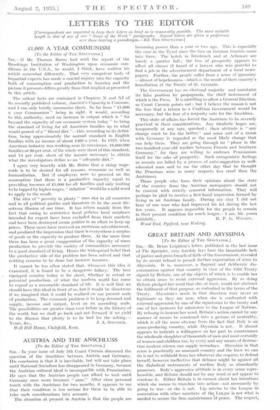AUSTRIA AND THE ANSCHLUSS
[To the Editor of THE SPECTATOR.]
SIR,—Tri your issue of July 5th Count Czernin discussed the question of the Ansehluss between Austria and Germany. His conclusion is that it is inevitable, but will not take place until National Socialism has disappeared in Germany, because the Austrian cultural ideal is incompatible with Prussianism. He says that the Austrian people can afford to wait until Germany once more becomes " sane." After close personal touch with the Austrians for two months, it appears to me that their condition is too serious for them to be able to take such considerations into account.
The situation at present in Austria is that the people are becoming poorer than a year or two ago. This is especially the case in the Tyrol since the ban on German tourists came into force. The hotels in Innsbruck and at Achensee are barely a quarter full ; the loss of prosperity appears to affect all classes (I heard of a lawyer who was grateful to find a job in the advertisement department of a local news- paper). Further, the people suffer from a sense of ignominy —almost of hopelessness—which is the result of their country's humiliation at the Treaty of St. Germain.
The Government has no electoral majority and maintain§ its false position by propaganda, the chief instrument of which is the Press. It is unwilling to allow a General Election, as Count Czernin points out ; but I believe the reason is not the fear that a return to a Coalition Government would be necessary, but the fear of a majority vote for the Anschluss: This state of affairs has forced the Austrians to be severely practical in their considerations. Any idealistic hopes are, temporarily at any rate, quashed ; their attitude is " any change must be for the better," and some sort of a union with Germany is regarded as the most likely change that can help them. They are going through no " phase in the two-hundred-year-old warfare between Prussia and Southern Germany," for they are willing to embrace Prussianism itself for the sake of prosperity. Such antagonistic feelings as remain are lulled by a process of auto-suggestion (a well- educated man said to me the other day that he thought the Prussians were in many respects less cruel than the Austrians).
Those people who form their opinions about the state of the country from the Austrian newspapers should not be content with strictly censored information. They will perhaps be glad to receive a first-hand impression formed by living in an Austrian family. During my stay I did not hear of one man who had improved his lot during the last few years. It appears impossible for the people to remain in their present condition for much longer.—I am, Sir, yours






































 Previous page
Previous page